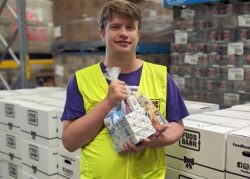A pillar of strength
Men’s Health Week is an opportunity to highlight the importance of men’s health, and to promote and support the health and wellbeing of men and boys in our communities and is designed to provoke thought and discussion about what needs to be done to improve male health.
Men are seen as stronger, physically and mentally than women. So much professional research and literature has been devoted to the development of social work interventions to empower women and meet their needs.
Rigid stereotypes of masculinity mean we need to address harmful forms of masculinity, as well as engage men and boys in gender equality.
A gender equal society benefits everyone. It makes our communities safer, healthier and more connected.
Paul is no stranger to gender stereotypes. A few years ago, Paul his partner and their two kids were living a comfortable life in Perth, he had a well-paying and fulfilling Government job, a great family life.
Just over a year ago, Paul noticed a change in behaviour of his partner which he eventually found out was drug related. For the safety and wellbeing of his children he fled Perth, leaving behind his job and starting fresh with his kids in Karratha, where is opened up his own small business.
For a while everything was fine until his ex-partner located him and the kids and caused all sorts of issues, meaning Paul and the kids had to once again take-off and find a safe haven. In the meantime, Paul found himself fighting in courts for the rights to gain sole custody of his kids and was treated sub-standardly at best. He said he had to jump through so many hoops to be heard and given the right to do what was in his children’s best interests. He says he felt completely alienated.
Now living in Geraldton, Paul says “during the legal challenges I found that men were not treated the same way as women who are viewed in a ‘softer’ light so the whole process is angled towards women, not set up for men.”
It’s a great community here, but I don’t have support network I would back in Perth and it was hard to reach out for help. This is the first time I haven’t been employed in my life.”
Foodbank has been a lifesaver, trying to find new work and paying for childcare is challenging and expensive – at Foodbank I can get a whole trolley of food for $80. I don’t know how I would support myself and my kids otherwise. My kids are safe and happy and not living on rations anymore. Going into the branch has been like walking into another family.”
David from Kalgoorlie agrees that it’s much harder for men to reach out for help. He faced what seemed like insurmountable obstacles when fighting for custody of his kids. He found that even applying for housing assistance as a man was more difficult – he was told that men are not a priority, women and children are, which led to him and his kids living in a tent for 4 months.
There are services and grants that he can’t access such as Occupational Therapy for his children because the funding is issued through a Women’s Health service for which means he is not eligible – meaning his kids miss out.
There was no judgement when David came to Foodbank after being persuaded by a friend who also happens to volunteer at the Kalgoorlie branch.
It allows me to afford the basics for my family, including toiletries for my daughter. The frozen meals especially have been helpful, both kids have massive trauma so there are days I’m so exhausted from being up all night the night before, and it’s a meal ready to go. It’s a well-rounded nutritious meal. Foodbank eases the burden massively.”
In Australia, Men’s Health Week provides a platform for challenging and debating key issues in men’s health and to raise the profile of men – the strengths of men, the contributions they make, and the important roles they play in society.
So lets celebrate all of the wonderful men in our lives from partners to friends to coworkers, to relatives, and encourage them to feel safe to reach out for help when they need to.
 Contact us
Contact us Log in
Log in
